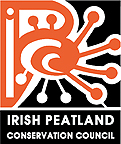Frog records spike following mild, wet winter say IPCC

February 10th 2016
On the celebration of World Wetlands Day, Tuesday the second of February, the Irish Peatland Conservation Council (IPCC) launched their ‘Hop To It’ Frog Survey. Running annually since 1997, this survey tracks changes to the range and numbers of frog populations over time. Frogs typically breed around February, and spawn in March, but this year the IPCC received a number of early records from various counties across the country.
“The spike in records of Ireland’s most common amphibian is most likely due to the strangely mild, wet winter”, according to Katie Geraghty, campaign officer at the IPCC. The records can consist of sightings of frog spawn, tadpoles, froglets or even adult frogs, who would be in hibernation during cold winters. The value in receiving records of where and when common frogs are seen is in their importance as ecosystem health indicators. “Frogs are indicators of habitat quality because they hold an important place in the food web of wetlands”, says Geraghty.
Following the warmest and wettest December ever recorded by Met Éireann, it is hardly surprising that premature ecological events such as this have been occurring across the British Isles. Many of these have been shared on Twitter with the hashtag ‘#weirdwinter’, where early leaves and flowers on trees, snowdrops, daffodils, crocuses, various insects and lots of frogspawn have been recorded.
The effects of Climate Change in Ireland are becoming more clear, with Met Éireann predicting an increase in the likelihood of warmer and wetter winters. As a result of this, what we have come to know as the signs of spring are unlikely to remain as predictable as they have been in the past, and changes on a large scale may have detrimental impacts on ecosystems. This reality makes it all the more important for the public to get involved in citizen science projects like the ‘Hop To It’ survey, and means that of the age of mass data sharing could not have arrived at a better time!
[x_button shape=”square” size=”mini” float=”none” href=”http://www.ipcc.ie/help-ipcc/hop-to-it-national-frog-survey-irelandcard/” info=”none” info_place=”top” info_trigger=”hover”]Click here to go to the ‘Hop To It’ survey[/x_button]
[x_author title=”About the Author”]








